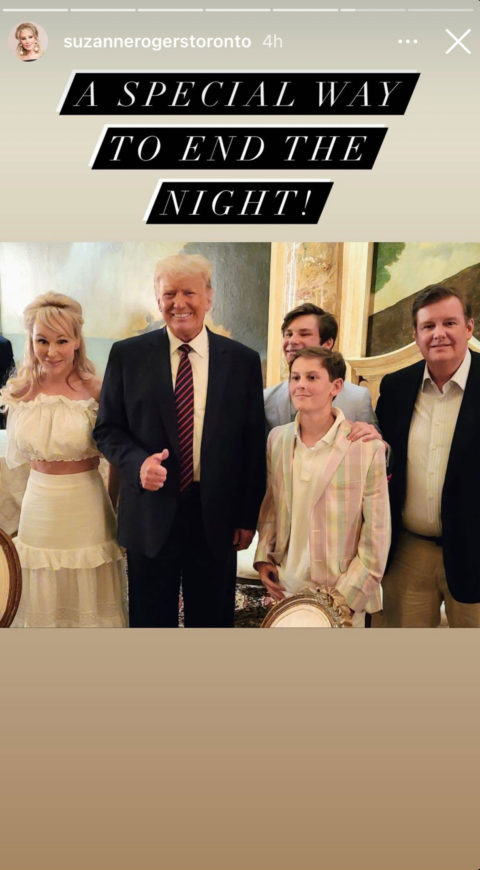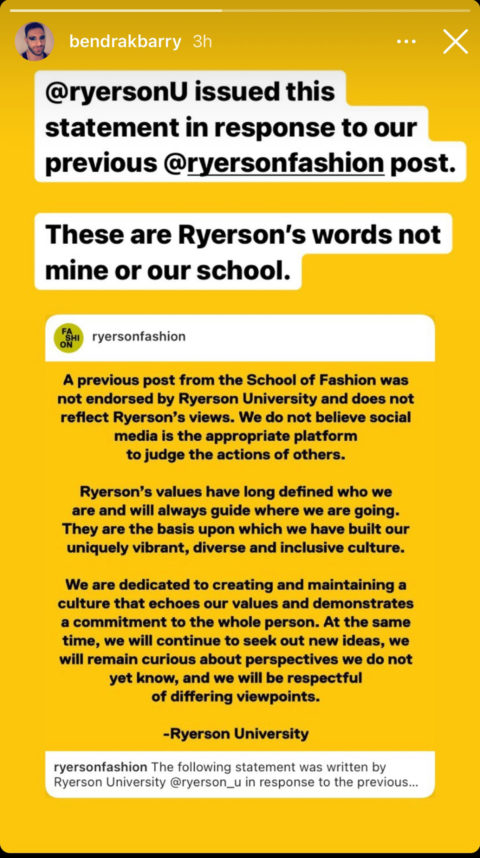The Fallout From Suzanne Rogers’ Photo With Donald Trump at Mar-a-Lago
Members of the Canadian fashion community reacted with condemnations to Rogers posing with former U.S. President Donald Trump, citing his lack of support for BIPOC and LGBTQ+ people.
On the morning of Saturday, May 1, Suzanne Rogers posted an Instagram Story posing with former U.S. President Donald Trump at his private club, Mar-a-Lago, in Palm Beach, Fla. Given that Rogers has positioned herself as the fairy godmother of Canadian fashion, members of that community reacted immediately with condemnations, citing Trump’s lack of support for BIPOC and LGBTQ+ people. In 2016, a $1 million donation from The Suzanne and Edward Rogers Foundation established the Suzanne Rogers Fashion Institute at Ryerson University to support emerging designers. Last November, the Foundation provided another gift of $1 million to the SRFI. But Rogers’ post seems to have trumped, so to speak, her previous financial goodwill.
Here is what we know so far:

Suzanne Rogers, her husband Edward and two sons dined at Mar-a-Lago on Friday and posed for a photo with Trump at the end of the evening. Rogers posted the photo with the caption, “A Special Way to End the Night!” By midday Saturday, after outrage began circulating online, Rogers took down the post.
Toronto designer Michael Zoffranieri was one of the first to express his dismay on social media, by reposting Rogers’ post, adding the caption, “Will Canadian fashion accept this?”

Phones began buzzing all over the city with members of the fashion community voicing their disapproval on social media and encouraging others to do the same. The Ryerson School of Fashion also posted a statement inviting “Suzanne Rogers to enter into a dialogue with our faculty, staff and students to discuss the impact that Trump and his community has had on further harming members of the fashion industry who are low income, Black, brown, Asian, disable, Indigenous, trans, queer, and/or part of other systemically marginalized communities.”
The post was later removed and replaced with a message from Ryerson University which includes the following: “We do not believe social media is the appropriate platform to judge the actions of others.” It also goes on to say, “We will be respectful of differing viewpoints,” which does little to quell the ire, especially among those associated with the Ryerson School of Fashion.

Ben Barry, the Ryerson School of Fashion’s Chair and Associate Professor of Equity, Diversity and Inclusion, shot back on Instagram Stories with a message that the Ryerson University statement “are Ryerson’s words not mine or our school,” referring to the School of Fashion.
Various observers begin questioning the integrity of Ryerson University, and whether they are motivated by the Rogers family’s deep financial contributions to the school, including the Ted Rogers School of Management.
Members of the SRFI Advisory Board begin resigning, including Hudson’s Bay Vice-President and Fashion Director Tyler Franch and communications consultant Lisa Tant.
Where things stand regarading the Suzanne Rogers Donald Trump backlash as of Sunday afternoon:
Toronto lawyer Anjli Patel, who teaches a fashion law course at Ryerson, writes a three-part letter to Mohamed Lachemi, president of Ryerson University, and posts it on her Instagram account, @anglitoronto. It notes that the School of Fashion’s guiding principles are inclusion, decolonization and sustainability. She encourages others to write to the head of the school as well.






